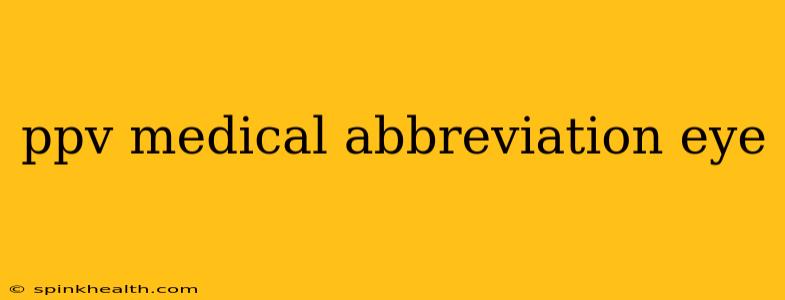PPV: Unraveling the Mystery Behind This Medical Eye Abbreviation
The medical world is filled with abbreviations, and sometimes deciphering them can feel like cracking a code. Today, we're tackling one such abbreviation: PPV, specifically in the context of ophthalmology (eye care). While PPV isn't a universally standardized abbreviation across all medical fields, in the realm of eye care, it commonly stands for Pars Plana Vitrectomy. Let's dive into what that means and explore some frequently asked questions.
What is Pars Plana Vitrectomy (PPV)?
Imagine your eye as a balloon filled with a jelly-like substance called the vitreous humor. This humor helps maintain the eye's shape. Sometimes, however, this vitreous can become cloudy, bleed, or contain debris that impairs vision. This is where pars plana vitrectomy comes in.
A PPV is a type of eye surgery where a surgeon removes all or part of the vitreous humor through a tiny incision made near the pars plana, a flat part of the ciliary body (the structure producing the fluid that nourishes the eye). Think of it like carefully draining some of the "balloon's" contents to improve its function. The surgeon then may replace the removed vitreous with a gas bubble or saline solution.
This delicate procedure is often necessary to treat various eye conditions, offering a pathway to improved vision or preventing further vision loss. The specific reasons for a PPV vary widely.
What Eye Conditions Require a Pars Plana Vitrectomy?
Several eye conditions may necessitate a pars plana vitrectomy. Let's explore some key examples:
- Macular holes: These are small tears in the macula, the part of the retina responsible for sharp, central vision. A PPV can help reposition the retina and allow it to heal.
- Diabetic retinopathy: This complication of diabetes can damage blood vessels in the retina, leading to bleeding and fluid leakage into the vitreous. PPV can help remove the blood and fluid, improving vision.
- Vitreous hemorrhage: Bleeding into the vitreous humor can significantly impair vision. PPV removes the blood, restoring clarity.
- Retinal detachment: This serious condition involves the separation of the retina from the underlying tissue. PPV often plays a crucial role in reattaching the retina.
- Epiretinal membranes: These are thin membranes that can form over the retina, distorting vision. PPV can remove the membrane, restoring clearer vision.
- Posterior vitreous detachment (PVD): Although often asymptomatic, a PVD can sometimes lead to complications like retinal tears or detachment. In these cases, a PPV might be necessary.
How is a Pars Plana Vitrectomy Performed?
The procedure is typically performed under local or general anesthesia. The surgeon makes tiny incisions near the pars plana, using specialized instruments to carefully remove the vitreous. The entire process is usually done with the aid of a microscope. Post-surgery, the patient usually needs to maintain certain positions to help the eye heal properly. The recovery period varies depending on the individual and the complexity of the surgery.
What are the Risks and Complications Associated with PPV?
Like any surgical procedure, PPV carries potential risks and complications, although these are relatively uncommon with skilled surgeons. Possible complications include:
- Infection: Infection is a risk with any surgery.
- Bleeding: While controlled bleeding is expected during the procedure, significant bleeding is a possible complication.
- Cataracts: PPV can sometimes increase the risk of developing cataracts.
- Retinal tear or detachment: Although the surgery aims to prevent or correct these, they remain potential risks.
It’s crucial to remember that this information is for educational purposes and shouldn't replace professional medical advice. If you have concerns about your eye health or are considering PPV, consult a qualified ophthalmologist for personalized guidance. They can assess your specific situation, explain the risks and benefits, and determine if PPV is the right treatment for you. Your eye health is invaluable, so always prioritize seeking expert advice.

